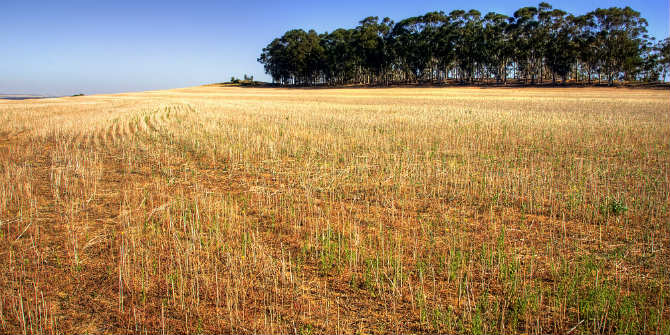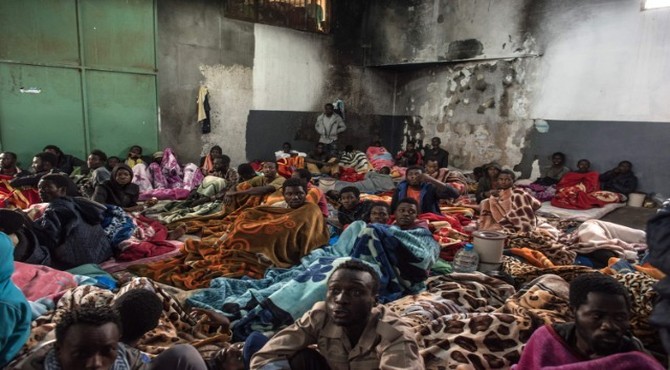Based on recent news report, LSE’s Mitchell Aghatise imagines the emotions and experiences of one of the girls recently rescued by the Nigerian army from the Boko Haram hideout in the Sambisa Forest.
Today was different. For the past few months we have been scavengers awaiting our next meal. Sustenance has become something to dread, death has become appealing.
Aisha was not from Chibok, but she was Nigerian. Or so she thought. Aisha basked in dreams of achievement, working tirelessly for it. Despite the pervasive poverty that spotted her area, she thought education was her ticket out. She was wrong. Her environment decided not to relinquish its grip; the narrative chose not to change, despite her best efforts.

That day was different too. The moment she was thrown against the iron bars of the rusty Hilux, she knew. In one fell swoop, her dreams had been dashed. Boko Haram had struck. All hope for her survival, for rescue, slowly faded as the vehicle maneuvered deeper into the Sambisa forest. She saw herself in all the girls who had made this trip before her, now awaiting her arrival. Formally strangers, but sisters, under this bond of broken dreams, dashed destinies, and an uncaring state.
She soon became a veteran, and as the Chibok schoolgirls were herded out of their respective vehicles, she knew. She was aware of the torture, rape and assaults that were awaiting these ones. Rather than empathise, her experience gave her numbness. Life as a captive, when no one cares for your return, and your country knows not of your absence, robs you of feeling. It robs you of humanity.
But, today was different. We’d woken up to find the camp deserted. The Nigerian army had come in, dislodged the militants and rescued us. For many nights, I had dreamt of this day. Sometimes, I yearned for it so badly that I’d wake up screaming with joy- quickly shutting my mouth to prevent the certain rifle blow from the attentive guard. But today, the anticipated day, I felt empty.
As the Nigerian troops arrived, I sought to scream in joy, but I was too overawed with the situation. I had lost feeling; I could not feel freedom. As Captain Igbokwe slipped me a bottle of water, I flinched, as I have become accustomed to a willing baton ready to strike. I could not comprehend an act of kindness from an outstretched hand. Hurriedly, without fanfare, they sent us to have pregnancy and HIV tests.
I am pregnant.
Although I have yearned for freedom for a long time, yet I am not free. It was not enough for Boko Haram to kidnap me physically, but the vermin took it a step further by planting his seed in my belly. My life has not merely been ruined by my captivity, but by my experience. My life has been ruined. A Boko Haram fighter has branded me with his seed in my belly.
It has now been a few weeks. I am trying to re-integrate. I know Goodluck Jonathan is now leaving office, so I will direct my requests to General Buhari.
Dear Sir, rescuing me and all the other girls was the easy part. Saving us is the difficult part. Many have lost their minds. I myself remain in the throes of post-traumatic stress disorder (PTSD). I feel as though I have no stake in this country. I am left with no education or the courage to stand up to my detractors. I will not walk into a school, because of the fear that I will return to this forest- Sambisa.
Dear Sir, as you seek to find the Chibok girls, I pray you, let your drive not be because of media interests. Let it be because they too are Nigerians; they too deserve the state’s protection. Sir, as we returned to our villages, the cheers and adulation of the Nigerian state seemed perfunctory. We barely seized the headlines. Thus, dear Nigerians, as we seek to find our Chibok girls, also remember that 200 girls were recently rescued from Sambisa.
The job is not yet complete. It will not be complete when the Chibok girls are rescued. The job will be completed when we save these girls. To save goes beyond military missions. As a guide to the policy of the incoming administration, I don’t demand that you only bring back our girls, but that you care for them when they get home.
Mitchell Aghatise is a postgraduate student at LSE and co-director of the 2015 LSE Africa Summit.
The views expressed in this post are those of the author and in no way reflect those of the Africa at LSE blog or the London School of Economics and Political Science.






Oh that our leaders will have the ear to hear this and the heart to respond as true leaders out for the good of their fellow citizens they presented themselves to serve selflessly. God bless Nigeria and God bless you my dear son and other voices that are crying for true freedom in our land.